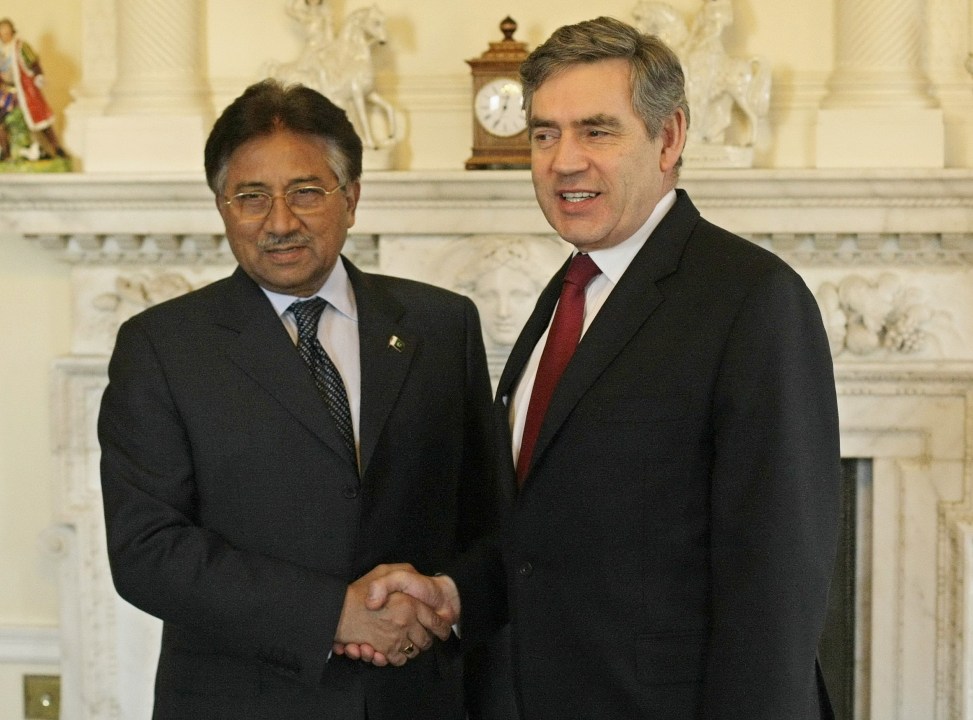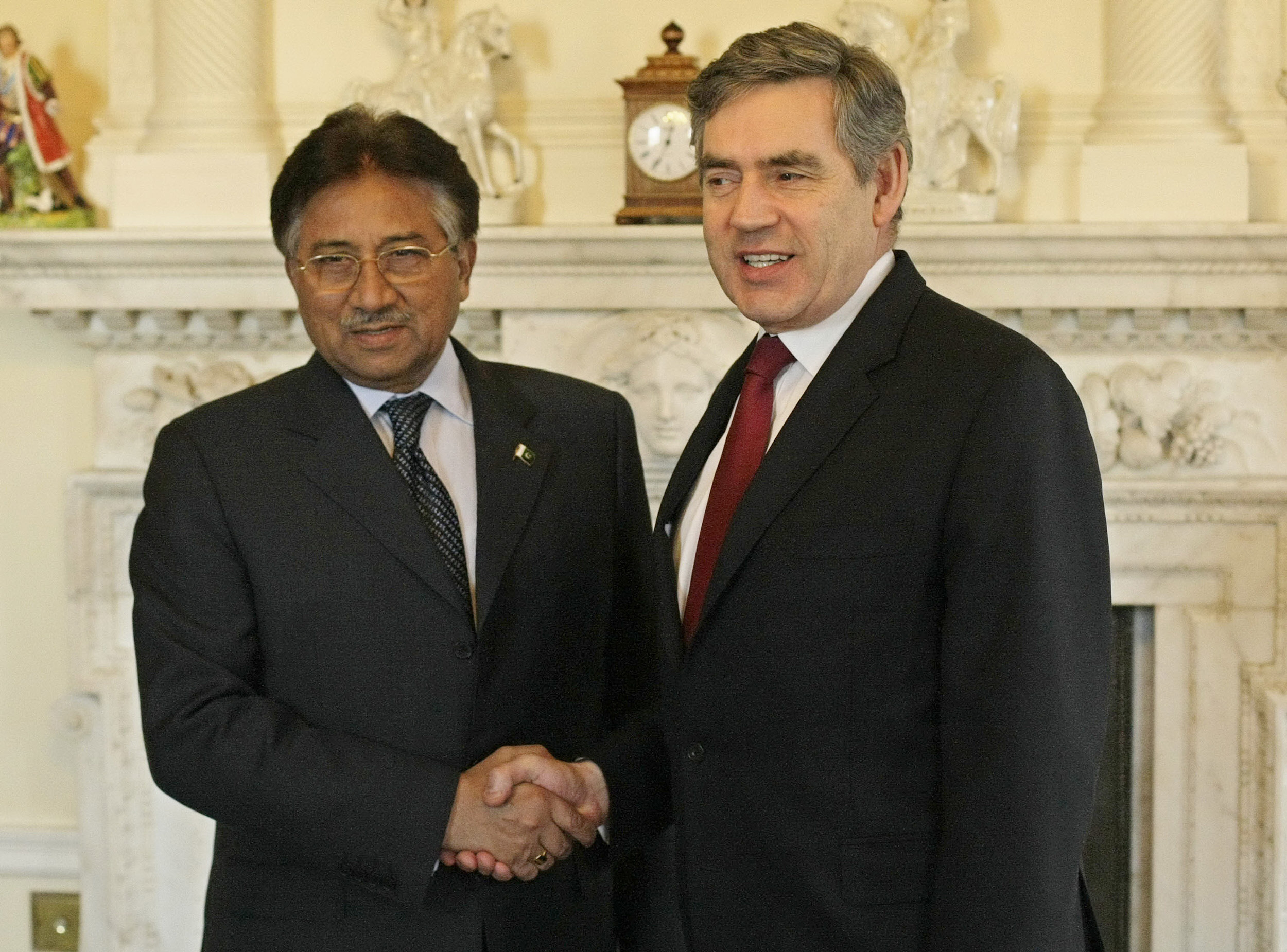 The harsh words exchanged during the recent American primaries have exemplified high decorum compared to the no-holds barred Pakistani election brawl. Accusations and counter-accusations, demonstrations and violence feature in this campaign, postponed from January 8th to February 18th after the assassination of opposition leader Benazir Bhutto. Election geeks compare the number of times “murder,” “terrorism” and “dictator” appear in the (lengthy) speeches of many opposition leaders with the frequency of President Pervez Musharraf’s pet phrases: “I saved Pakistan,” “gave it an economic revival,” and made it “dynamic and progressive.”
The harsh words exchanged during the recent American primaries have exemplified high decorum compared to the no-holds barred Pakistani election brawl. Accusations and counter-accusations, demonstrations and violence feature in this campaign, postponed from January 8th to February 18th after the assassination of opposition leader Benazir Bhutto. Election geeks compare the number of times “murder,” “terrorism” and “dictator” appear in the (lengthy) speeches of many opposition leaders with the frequency of President Pervez Musharraf’s pet phrases: “I saved Pakistan,” “gave it an economic revival,” and made it “dynamic and progressive.”
On Monday, during eight days of glad-handing round Europe meeting leaders including Gordon Brown, Musharraf spoke in London of having removed “bugs” from the system, claiming his government was defeating extremism.
Yet in the past week alone, gunmen, armed with rocket-propelled grenade launchers and Kalashnikov assault rifles, kidnapped 200 school children in the tribal area of the North West Frontier Province. Two decapitated policemen were found in the same region, where the military is reporting an upsurge in heavy fighting with insurgents at the Afghan border. With al-Qaeda and the Taliban highly active, the election is being seen as a referendum on Musharraf himself, as his actions have made him increasingly unpopular.
Since July 2007, when security forces stormed a radical mosque where militants had amassed a load of weapons, violence and suicide bombings have been on the increase. In November 2007, Musharraf deposed the Pakistani Chief Justice Iftikhar Mohammed Chaudry, placing him under house arrest, and detaining many other lawyers at the same time. This was seen as a gross infringement of the independence of the judiciary; and led to widespread protests by members of the legal profession, the most recent of which took place on Thursday in the capital Islamabad and across Pakistan.
Amnesty International is calling for the release of the Chief Justice and all detainees. The President of the Supreme Court Bar Association who was also arrested has just been freed- but its too little too late- Musharraf has already made a lot of Pakistanis very angry.
Pakistan is divided into four provinces; wealthy, fertile Punjab, where the main election contest will take place, Balochistan to the West, Sindh in the South and the troubled North West Frontier Province where the Government has the least control. Sources are already reporting that gunmen have paid some political opponents in the lawless tribal areas to stay out of the contest, while others have been murdered.
There are a whole host of groups, some large, some small, which may figure over the next 15 days. But the four significant parties slugging it out are: the Pakistan Muslim League (Q), led by Chaudhry Shujaat Hussain, which supports Musharraf; the Pakistan Muslim League (N) led by former Prime Minister Nawaz Sharif; the Pakistan Peoples’ Party now led by Asif Ali Zardari, husband of the assassinated Benazir Bhutto, with their 19-year old son Bilawal Bhutto Zardari; and the Muttahida Qaumi Movement, led by Altaf Hussein. The parties are usually referred to by their initials.
With its highly porous borders, Pakistan is the central battlefield in the international fight against Islamic militancy, sitting as it does next to Afghanistan and Iran and in the neighbourhood of Iraq.
What happens in Pakistan matters to Britain, then. Especially with the Pakistani population in the UK – many of them Labour party constituents – estimated at just under a million. Though Musharraf says that UK-based Islamist cells are home-grown and a problem that Brown should deal with, he must think British policy makers are too dim to appreciate the proven links with his country, let alone do anything about it.
Various Pakistani leaders have bases in London and rely on key officials and supporters in the UK. Elite families prefer to have their offspring educated colonial-style in England, and Knightsbridge is relaxing during the heat of the Pakistani summer. Pronouncements made in London can catch world attention more easily than if they are made at home. The MQM’s Altaf Hussein lives in London and gives speeches to massed rallies of thousands in Pakistan down a speakerphone on his desk. He can bring Karachi to a standstill from an office in Edgware.
Oh, and as evidence of “fair, free and transparent elections” this time around, a Pakistani Government political officer, Manzoor ul Haq, announced in London this week that for the first time, “Transparent ballot boxes will be used, with strong seals.”
That’s alright then…







Comments